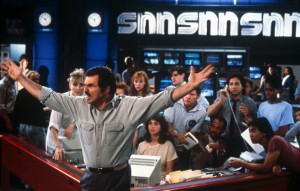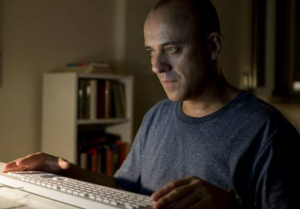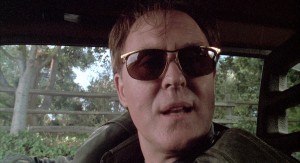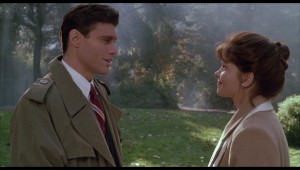From the Chicago Reader (February 12, 1988). — J.R.

The fourth and least successful movie version — after Lewis Milestone’s (1931), Howard Hawks’s (1940), and Billy Wilder’s (1974) — of Ben Hecht and Charles MacArthur’s by now overrated farcical play The Front Page. In fact, by following Hawks’s His Girl Friday in making the leading character a woman, this updating by screenwriter Jonathan Reynolds and director Ted Kotcheff qualifies as a remake of a remake. The setting is now a cable news network instead of a big city newspaper, and there are many smaller substitutions (e.g., a copy machine in place of a rolltop desk). But despite a lot of overstrenuous efforts, the grafting of an 80s context onto a 40s adaptation of a play from the 20s mainly adds up to incoherence; the original’s treatment of journalistic behavior and ethics isn’t so much rethought as clumsily transposed, depriving it of any polemical bite and placing it miles away from the knowing details of Broadcast News. Burt Reynolds, Kathleen Turner, and Christopher Reeve are the leads; Henry Gibson is the hapless victim slated to die in the electric chair; and Ned Beatty is the corrupt politician who wants him to fry. Read more
Written for the Fipresci web site on September 18 2017. — J.R.

Adapting a novella of the same title by Javier Cercas (available in English in the 2006 volume The Tenant and the Motive, translated by Anne McLean for Bloomsbury Publishing), writer-director Manuel Martín Cuenca’s black comedy about the lures and potential perils of yarn-spinning focuses on a hapless and naïve bureaucrat in Seville named Álvaro (Javier Gutiérrez) working as a notary clerk and longing to be a serious and successful novelist, unlike his author wife Amanda (Maria Léon), who writes best-selling but unserious novels (at least according to her husband).

Curiously, the Spanish title of both the novella and the film, El Autor, means “the author,” not “the motive” (the English title of both). But it must be conceded that Álvaro is a highly, even willfully and monomaniacally motivated author as well as a rather stupid sociopath. Taking a writing course from a testy and critical teacher named Juan (Antonio de la Torre), who berates his clichéd prose, he leaves his wife after he discovers via their pet dog that she’s having an affair and, after his boss, noticing his distractedness, urges him to take an extended vacation, moves into a flat of his own to concentrate full-time on writing his first novel. Read more

I’m of two minds about Brian De Palma’s Raising Cain (1992), thanks to
Arrow Video’s spiffy three-disc dual format edition—specifically, about
what’s called Raising Cain: The Director’s Cut on disc #3 (“limited edition
Blu-Ray exclusive”), “a De Palma-endorsed recreation of the film by Peet
Gelderblom, re-ordered as originally planned”.

One of my minds agrees with Gelderblom that this is a
(slightly) more satisfying edit of a film I reviewed in the
Chicago Reader as follows: “Brian De Palma’s 1992 thriller
perform stylistic pirouettes around a void, it’s full of sleek
and pleasurable moments. If I’m right about the story,
which is mainly composed out of loose pieces of Psycho
and Peeping Tom, a warped child psychologist (John
Lithgow) kidnaps his own granddaughter to avenge the
adultery of his son’s wife (Lolita Davidovich), and
frames her lover (Steven Bauer) for the crime. But
maybe I’ve got it all wrong and it’s the son’s evil twin
who’s doing the kidnapping; Lithgow also plays this
character, along with the son and other personalities
too numerous and obscure to fathom. Produced by
De Palma’s wife Gale Anne Hurd (The Abyss); with
Frances Sternhagen, Gregg Henry, Tom Bower, and
Mel Harris. Read more





